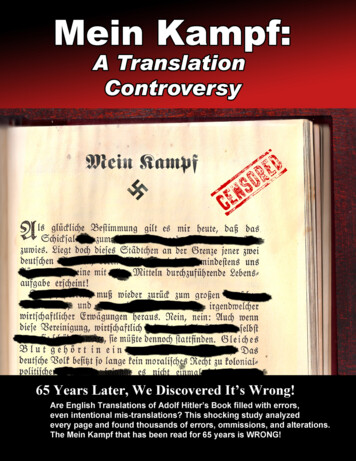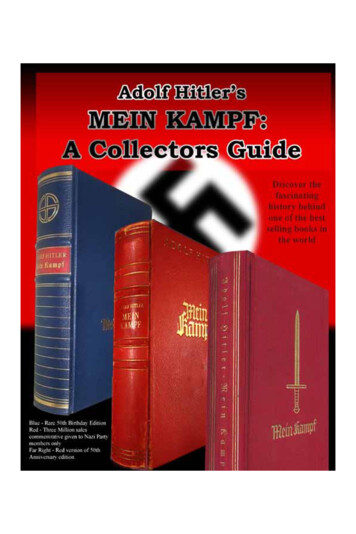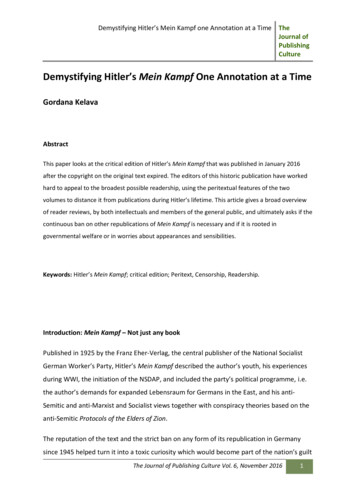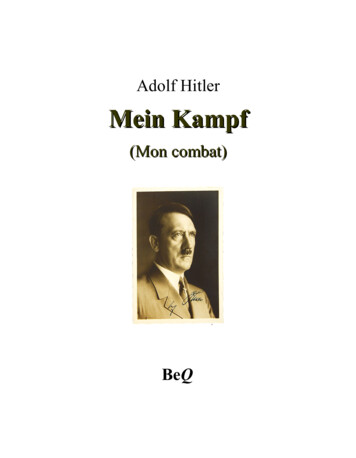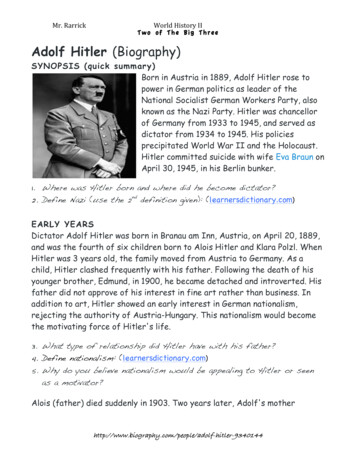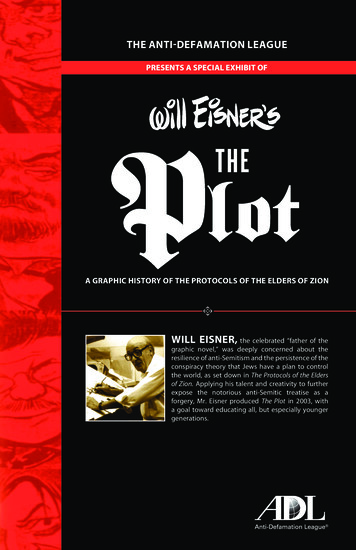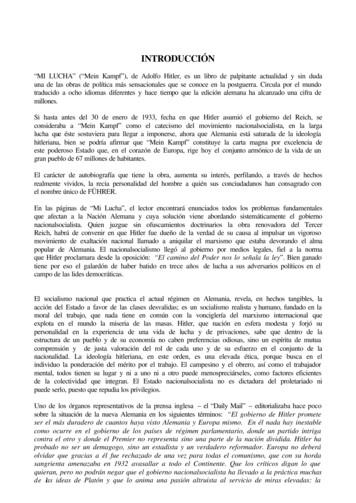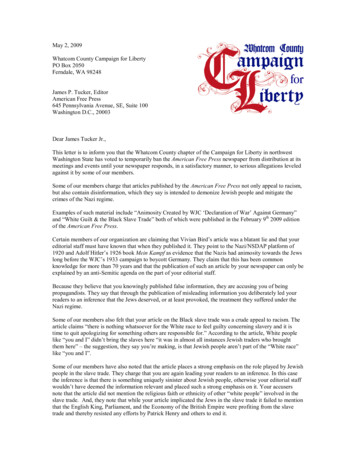
Transcription
MEIN KAMPFThe Stalag Edition:The Only Complete and Officially Authorised EnglishTranslation Ever IssuedADOLF HITLEROstara Publications2
Mein KampfThe Stalag Edition: The Only Complete and Officially Authorised EnglishTranslation Ever IssuedBy Adolf HitlerTranslator: Unknown NSDAP member.First issued asMy StruggleBy Adolf HitlerZentral Verlag Der NSDAP, Franz Eher Nachf. GMBH 1937–1944.This editionOstara Publicationshttp://ostarapublications.com3
Original title page of a copy of the only official English translation of MeinKampf ever issued, complete with Stalag camp number 357 stamp.Stalag 357 was located in Kopernikus, Poland, until September 1944, when itwas moved to the old site of the former Stalag XI-D, near the town ofFallingbostel in Lower Saxony, in north-western Germany.4
Its internees included British air crews, and later, British soldiers captured atthe Battle of Arnhem.5
6
CONTENTSAUTHOR’S PREFACEVOLUME ONE A ReckoningCHAPTER 1: MY HOMECHAPTER II: LEARNING AND SUFFERING IN VIENNACHAPTER III: VIENNA DAYS—GENERAL REFLECTIONSCHAPTER IV: MUNICHCHAPTER V: THE WORLD WARCHAPTER VI: WAR PROPAGANDACHAPTER VII: THE REVOLUTION IN 1918CHAPTER VIII: THE BEGINNING OF MY POLITICAL ACTIVITIESCHAPTER IX: THE GERMAN LABOUR PARTYCHAPTER X: THE COLLAPSE OF THE SECOND REICHCHAPTER XI: NATION AND RACECHAPTER XII: THE FIRST STAGE IN THE DEVELOPMENT OF THE NATIONAL SOCIALISTGERMAN LABOUR PARTYVOLUME TWO The National Socialist MovementCHAPTER 1: WELTANSCHAUUNG AND PARTYCHAPTER II: THE STATECHAPTER III: CITIZENS AND SUBJECTS OF THE STATECHAPTER IV: PERSONALITY AND THE IDEAL OF THE VÖLKISCH STATECHAPTER V: WELTANSCHAUUNG AND ORGANISATIONCHAPTER VI: THE FIRST PHASE OF OUR STRUGGLE—THE SIGNIFICANCE OF THESPOKEN WORDCHAPTER VII: THE STRUGGLE WITH THE REDSCHAPTER VIII: THE STRONG ARE STRONGER WITHOUT ALLIESCHAPTER IX: NATURE AND ORGANISATION OF THE STORM TROOPSCHAPTER X: THE MASK OF FEDERALISMCHAPTER XI: PROPAGANDA AND ORGANISATIONCHAPTER XII: THE PROBLEM OF THE TRADE-UNIONSCHAPTER XIII: THE GERMAN POLICY OF ALLIANCES7
CHAPTER XIV: EASTERN BIAS OR EASTERN POLICYCHAPTER XV: THE RIGHT TO SELF-DEFENCEEPILOGUE8
9
AUTHOR’S PREFACEOn April 1st, 1924, I began to serve my sentence of detention in theFortress of Landsberg am Lech, following the verdict pronounced by theMunich People’s Court on that day.After years of uninterrupted labour it was now possible for the first timeto begin a work for which many had asked and which I myself felt would beprofitable for the Movement. I therefore decided to devote two volumes to adescription not only of the aims of our Movement, but also of its development.There is more to be learned from this than from any purely doctrinaire treatise.This has also given me the opportunity of describing my owndevelopment in so far as such a description is necessary to the understandingof the first as well as of the second volume and to refute the unfounded taleswhich the Jewish press has circulated about me.In this work I turn not to strangers, but to those followers of theMovement whose hearts belong to it and who wish to study it more profoundly.I know that fewer people are won over by the written, than by the spoken,word and that every great movement on this earth owes its growth to greatspeakers and not to great writers.Nevertheless, in order to achieve more equality and uniformity in thedefence of any doctrine, its fundamental principles must be committed towriting. May these two volumes therefore serve as building stones which Icontribute to the common task.The Fortress, Landsberg am Lech.10
At half-past twelve on the afternoon of November 9th, 1923, thosewhose names are given below fell in front of the Feldherrnhalle and in theforecourt of the former War Ministry in Munich as loyal believers in theresurrection of their people:Alfarth, Felix, Merchant, born July 5th, 1901Bauriedl, Andreas, Hatter, born May 4th, 1879Casella, Theodor, Bank Official, born August 8th, 1900Ehrlich, Wilhelm, Bank Official, born August 19th, 1894Faust, Martin, Bank Official, born January 27th, 1901Hechenberger, Ant., Mechanic, born September 28th, 1902Koerner, Oskar, Merchant, born January 4th, 1875Kuhn, Karl, Headwaiter, born July 26th, 1897Laforce, Karl, Student of Engineering, born October 2 8th, 1904Neubauer, Kurt, Man-servant, born March 27th, 1899Pape, Claus von, Merchant, born August 16th, 1904Pfordten, Theodor von der, Councillor to the Supreme Provincial Court,born May 14th, 1873Rickmers, Joh., retired Cavalry Captain, born May 7th, 1881Scheubner-Richter, Max Erwin von, Dr. of Engineering, born January9th, 1884Stransky, Lorenz, Ritter von, Engineer, born March 14th, 1899Wolf, Wilhelm, Merchant, born October 19th, 1898The so-called national authorities refused to allow the dead heroes acommon grave. I therefore dedicate to them the first volume of this work, as a11
common memorial, in order that they, as martyrs to the cause, may be apermanent inspiration to the followers of our Movement.The Fortress,Landsberg am Lech,October 16th, 1924.12
13
VOLUME ONE A RECKONING14
15
CHAPTER 1: MY HOMETo-day I consider it a good omen that Destiny appointed Braunau-on-theInn to be my birthplace, for that little town is situated just on the frontierbetween those two German States, the reunion of which seems, at least to us ofthe younger generation, a task to which we should devote our lives, and in thepursuit of which every possible means should be employed.German-Austria must be restored to the great German Fatherland, andnot on economic grounds. Even if the union were a matter of economicindifference, and even if it were to be disadvantageous from the economicstandpoint, it still ought to take place. People of the same blood should be inthe same Reich.The German people will have no right to engage in a colonial policyuntil they have brought all their children together in one State. When theterritory of the Reich embraces all Germans and proves incapable of assuringthem a livelihood, only then can the moral right arise, from the need of thepeople, to acquire foreign territory. The plough is then the sword, and the tearsof war will produce the daily bread for the generations to come.For this reason the little frontier town appeared to me as the symbol of agreat task, but in another respect it teaches us a lesson that is applicable to ourday. Over a hundred years ago this sequestered spot was the scene of a tragiccalamity which affected the whole German nation and will he remembered forever, at least in the annals of German history.At the time of our Fatherland’s deepest humiliation, a Nürnbergbookseller, Johannes Palm, an uncompromising nationalist and an enemy of theFrench, was put to death here because he had loved Germany even in hermisfortune. He obstinately refused to disclose the names of his associates, orrather the principals who were chiefly responsible for the affair, just as LeoSchlageter did.The former, like the latter, was denounced to the French by a governmentofficial, a director of police from Augsburg who won ignoble renown on thatoccasion and set the example which was to be copied at a later date by theGerman officials of the Reich under Herr Severing’s regime.In this little town on the Inn, hallowed by the memory of a German16
martyr a town that was Bavarian by blood but under the rule of the AustrianState, my parents were domiciled towards the end of the last century. My fatherwas a civil servant who fulfilled his duties very conscientiously.My mother looked after the household and lovingly devoted herself to thecare of her children of that period I have not retained many memories, becauseafter a few years my father had to leave that frontier town which I had come tolove so much and take up a new post farther down the Inn valley, at Passau,therefore, actually in Germany itself.In those days it was the usual lot of an Austrian civil servant to betransferred periodically from one post to another. Not long after coming toPassau my father was transferred to Linz, and while there he retired to live onhis pension, but this did not mean that the old gentleman would now rest fromhis labours.He was the son of a poor cottager, and while still a boy he grew restlessand left home. When he was barely thirteen years old he buckled on his satcheland set forth from his native country parish. Despite the dissuasion of villagerswho could speak from ‘experience’, he went to Vienna to learn a trade there.This was in the fifties of last century.It was a sore trial, that of deciding to leave home and face the unknown,with three gulden in his pocket but when the boy of thirteen was a lad ofseventeen and had passed his apprenticeship examination as a craftsman, hewas not content. On the contrary, the persistent economic depression of thatperiod and the constant want and misery strengthened his resolution to give upworking at a trade and strive for ‘something higher.’As a boy it had seemed to him that the position of the parish priest in hisnative village was the highest in the scale of human attainment, but now that thebig city had enlarged his outlook the young man looked up to the dignity of astate official as the highest of all. With the tenacity of one whom misery andtrouble had already made old when only half-way through his youth, the youngman of seventeen obstinately set out on his new project and stuck to it until hewon through.He became a civil servant. He was about twenty-three years old, I think,when he succeeded in making himself what he had resolved to become. Thushe was able to keep, the vow he had made as a poor boy, not to return to hisnative village until he was ‘somebody.’ He had gained his end, but in the17
village there was nobody who remembered him as a little boy, and the villageitself had become strange to him.Now at last, when he was fifty-six years old, he gave up his activecareer, but he could not bear to be idle for a single day. On the outskirts of thesmall market-town of Lambach in Upper Austria he bought a farm and tilled ithimself. Thus, at the end of a long and hard-working career, he returned to thelife which his father had led.It was at this period that I first began to have ideals of my own. I spent agood deal of time scampering about in the open, on the long road from school,and mixing with some of the roughest of the boys, which caused my mothermany anxious moments. All this tended to make me something quite the reverseof a stay-at-home.I gave scarcely any serious thought to the question of choosing a vocationin life, but I was certainly quite out of sympathy with the kind of career whichmy father had followed. I think that an inborn talent for speaking now began todevelop and take shape during the more or less strenuous arguments which Iused to have with my comrades.I had become a juvenile ringleader who learned well and easily atschool, but was rather difficult to manage. In my free time I practised singing inthe choir of the monastery church at Lambach, and thus it happened that I wasplaced in a very favourable position to be emotionally impressed again andagain by the magnificent splendour of ecclesiastical ceremonial.What could be more natural for me than to look upon the abbot asrepresenting the highest human ideal worth striving for, just as the position ofthe humble village priest had appeared so to my father in his own boyhooddays?At least that was my idea for a while, but the childish disputes I had withmy father did not lead him to appreciate his son’s oratorical gifts in such a wayas to see in them a favourable promise for such a career, and so he naturallycould not understand the boyish ideas I had in my head at that time. Thiscontradiction in my character made him feel somewhat anxious.As a matter of fact, that transitory yearning after such a vocation soongave way to hopes that were better suited to my temperament. Browsing amongmy father’s books, I chanced to come across some publications that dealt with18
military subjects. One of these publications was a popular history of theFranco-German War of 1870–71.It consisted of two volumes of art illustrated periodical dating fromthose years. These became my favourite reading. In a little while that great andheroic conflict began to occupy my mind, and from that time onwards I becamemore and more enthusiastic about everything that was in any way connectedwith war or military affairs.The story of the Franco-German War had a special significance for meon other grounds also. For the first time, and as yet only in quite a vague way,the question began to present itself: Is there a difference—and if there be, whatis it—between the Germans who fought that war, and the other Germans?Why did not Austria also take part in it? Why did not my father and allthe others fight in that struggle? Are we not the same as the other Germans? Dowe not all belong together?That was the fiat time that this problem began to agitate my small brain,and from the replies that were given to the questions which I asked verytentatively, I was forced to accept the fact, though with a secret envy, that notall Germans had the good luck to belong to Bismarck’s Reich. This wassomething that I could not understand.It was decided that I should study. Considering my character as a whole,and especially my temperament, my father decided that the classical subjectsstudied at the Gymnasium were not suited to my natural talents, lie thought thatthe Realschule would suit me better.My obvious talent for drawing confirmed him in that view, for in hisopinion, drawing was a subject too much neglected in the AustrianGymnasium. Probably also the memory of the hard road which he himself hadtravelled contributed to make him look upon classical studies as unpracticaland accordingly to set little value on them.At the back of his mind he had the idea that his son should also become agovernment official. Indeed he had decided on that career for me. Thedifficulties with which he had had to contend in making his own career led himto overestimate what he had achieved, because this was exclusively the resultof his own indefatigable industry and energy.The characteristic pride of the self-made man caused him to cherish the19
idea that his son should follow the same calling and if possible rise to a higherposition in it. Moreover, this idea was strengthened by the consideration thatthe results of his own life’s industry had placed him in a position to facilitatehis son’s advancement in the same profession.He was simply incapable of imagining that I might reject what had meanteverything in life to him. My father’s decision was simple, definite, clear andin his eyes, it was something to be taken for granted.A man of such a nature who had become an autocrat by reason of hisown hard struggle for existence, could not think of allowing ‘inexperienced’and irresponsible young people to choose their own careers.To act in such a way, where the future of his own son was concerned,would have been a grave and reprehensible weakness in the exercise ‘ofparental authority and responsibility, something utterly incompatible with hischaracteristic sense of duty.’ Still, he did not have his way.For the first time in my life (I was then eleven years old) I felt myselfforced into open opposition. No matter how hard and determined my fathermight be about putting his own plans and opinions into effect, his son was noless obstinate in refusing to accept ideas on which he set little or no value. Iwould not become a civil servant.No amount of persuasion and no amount of ‘grave’ warnings could breakdown that opposition. I would not become a government official, not on anyaccount.All the attempts which my father made to arouse in me a love or likingfor that profession, by picturing his own career for me, had only the oppositeeffect. It nauseated me to think that one day I might be fettered to an officestool, that I could not dispose of my own time, but would be forced to spendthe whole of my life filling out forms.One can imagine what kind of thoughts such a prospect awakened in themind of a boy who was by no means what is called a ‘good boy’ in the currentsense of that term. The ease with which I learned my lessons made it possiblefor me to spend, far more time in the open air than at home.To-day, when my political opponents pry into my life, as far back as thedays of my boyhood, with diligent scrutiny so as finally to be able to provewhat disreputable tricks this Hitler was, accustomed to play in his young day, I20
thank Heaven that I can look back on those happy days and find the memory ofthem helpful.The fields and the woods were then the terrain on which all disputeswere fought out. Even attendance at the Realschule could not alter my way ofspending my time. But I had now another battle to fight.So long as the paternal plan to make me a state functionary contradictedmy own inclinations only in the abstract, the conflict was easy to bear. I couldbe discreet about expressing my person it views and thus avoid constantlyrecurrent disputes.My own resolution not to become a government official was sufficientfor the time being to put my mind completely at rest. I held on to that resolutioninexorably.But the situation became more difficult once I had a positive plan of myown which I could present to my father as a counter-suggestion. This happenedwhen I was twelve years old. How it came about I cannot exactly say now, butone day it became clear to me that I wanted to be a painter—I mean an artist.That I had an aptitude for drawing was an admitted fact. It was even oneof the reasons why my father had sent me to the Realschule; but he had neverthought of having that talent developed so that I could take up painting as aprofessional career. Quite the contrary.When, as a result of my renewed refusal to comply with his favouriteplan, my father asked me for the first time what I myself really wished to be,the resolution that I had already formed expressed itself almost automatically.For a while my father was speechless.“A painter? An artist?” he exclaimed.He wondered whether I was in a sound state of mind. He thought that hemight not have caught my words rightly, or that he had misunderstood what Imeant, but when I had explained my ideas to him and he saw how seriously Itook them, he opposed them with his characteristic energy. His decision wasexceedingly simple and could not be deflected from its course by anyconsideration of what my own natural qualifications really were.“Artist! Not as long as I live, never.” As the son had inherited some ofthe father’s obstinacy, along with other qualities, his reply was equally21
energetic, but, of course, opposed to his, and so the matter stood. My fatherwould not abandon his ‘Never,’ and I became all the more determined in my‘Nevertheless.’Naturally the resulting situation was not pleasant. The old gentleman wasembittered and indeed so was I, although I really loved him. My father forbademe to entertain any hopes of taking up painting as a profession. I went a stepfurther and declared that I would not study anything else. With suchdeclarations the situation became still more strained, so that the old gentlemandecided to assert his parental authority at all costs.This led me to take refuge in silence, but I put my threat into execution. Ithought that, once it became clear to my father that I was making no progress atthe Realschule, he would be forced to allow me to follow the career I haddreamed of.I do not know whether I calculated rightly or not. Certainly my failure tomake progress became apparent in the school. I studied just those subjects thatappealed to me, especially those which I thought might be of advantage to melater on as a painter. What did not appear to have any importance from thispoint of view, or what did not otherwise appeal to me, I completely neglected.My school reports of that time were always in the extremes of good orbad, according to the subject and the interest it had for me. In one column theremark was ‘very good’ or ‘excellent, in another ‘average’ or even ‘belowaverage.’ By far my best subjects were geography and general history. Thesewere my two favourite subjects, and I was top of the class in them.When I look back over so many years and try to judge the results of thatexperience I find two very significant facts standing out clearly before mymind. Firstly, I became a nationalist. Secondly, I learned to understand andgrasp the true meaning of history.The old Austria was a multi-national State. In those days at least, thecitizens of the German Reich, taken all in all, could not understand what thatfact meant in the everyday life of the individuals within such a State.After the magnificent triumphant march of the victorious armies in theFranco-German War the Germans in the Reich became steadily more and moreestranged from the Germans beyond their frontiers, partly because they did notdeign to appreciate those other Germans at their, true value or simply because22
they were incapable of doing so. In thinking of Austria, they were prone toconfuse the decadent dynasty and the people which was essentially very sound.The Germans in the Reich did not realise that if the Germans in Austriahad not been of the best racial stock they could never have given the stamp oftheir own character to an Empire of fifty-two millions, so definitely that inGermany itself the idea arose—though quite erroneously—that Austria was aGerman State.That was an error which had dire consequences; but all the same it was amagnificent testimony to the character of the ten million Germans in theOstmark. Only very few Germans in the Reich itself had an idea of the bitterstruggle which those Eastern Germans had to carry on daily for thepreservation of their German language, their German schools and their Germancharacter.Only to-day, when a tragic fate has wrested several millions of ourkinsfolk from the Reich and has forced them to live under the rule of thestranger, dreaming of that common fatherland towards which all their yearningsare directed and struggling to uphold at least the sacred right of using theirmother tongue—only now have the wider circles of the German populationcome to realise what it means to have to fight for the traditions of one’s race.So at last, perhaps there are people here and there who can assess thegreatness of that German spirit which animated the old Ostmark and enabledthose people, left entirely dependent on their own resources, to defend theReich against the Orient for several centuries and subsequently to hold thefrontiers of the German language by means of a guerilla warfare of attrition, ata time when the German Reich was sedulously cultivating an interest incolonies but not in its own flesh and blood at its very threshold.What has happened always and everywhere, in every kind of struggle,happened also in the language fight which was carried on in the old Austria.There were three groups the fighters, those who were luke-warm, and thetraitors.This sifting process began even in the schools and it is worth noting thatthe struggle for the language was waged perhaps in its bitterest form around theschool, because this was the nursery where the seeds had to be tended whichwere to spring up and form the future generation.23
The tactical objective of the fight was the winning over of the child, andit was to the child that the first rallying cry was addressed, “German boy, donot forget that you are a German,” and “Remember, little girl, that one day youmust be a German mother.”Those who know something of the juvenile spirit can understand howyouth will always lend a ready ear to such a rallying cry. In many ways theyoung people led the struggle, fighting in their own manner and with their ownweapons. They refused to sing non-German songs.The greater the efforts made to win them away from their Germanallegiance, the more they exalted the glory of their German heroes. They stintedthemselves in buying sweetmeats, so that they might spare their pennies to helpthe war fund of their elders.They were incredibly alert to the significance of what the non-Germanteachers said and they contradicted in unison. They wore the forbiddenemblems of their own nation and were happy when penalized, or evenphysically punished. In their own way, they faithfully mirrored their elders, andoften their attitude was finer and more sincere.Thus it was that at a comparatively early age I took part in the strugglewhich the nationalities were waging against one another in the old Austria.When collections were made for the youth Mark German League and theSchool League we wore cornflowers and black-red-gold colours to expressour loyalty. We greeted one another with Heil! and instead of the Austriananthem we sang our own Deutschland uber Alles, despite warnings andpenalties.Thus the youth was being educated politically, at a time when the citizensof a so-called national State for the most part knew little of their ownnationality except the language.Of course, I did not belong to the luke-warm section. Within a littlewhile I had become an ardent ‘German National,’ which had a differentmeaning from the party significance attached to that term to-day.I developed very rapidly in the nationalist direction, and by the time Iwas fifteen years old, I had come to understand the distinction betweendynastic patriotism and völkisch nationalism, my sympathies being entirely infavour of the latter even in those days.24
Such a preference may not perhaps be clearly intelligible to those whohave never taken the trouble to study the internal conditions that prevailed inAustria under the Habsburg monarchy.In Austria it was world-history as taught in schools that served to sowthe seeds of this development, for Austrian history, as such, is practically nonexistent.The fate of this State was closely bound up with the existence anddevelopment of Germany as a whole, so that a division of history into Germanhistory and Austrian history is practically inconceivable. And indeed it wasonly when the German people came to be divided between two States that thisdivision began to make German history.The insignia of a former imperial sovereignty which were still preservedin Vienna appeared to act as a magic guarantee of an everlasting bond of union.When the Habsburg State crumbled to pieces in 1918 the AustrianGermans instinctively raised an outcry for union with their German mothercountry. That was the voice of unanimous yearning in the hearts of the wholepeople for a return to the unforgotten home of their fathers.But such a general yearning could not be explained except by thehistorical training through which the individual Austrian Germans had passed.It was a spring that never dried up. Especially in times of distraction andforgetfulness its quiet voice was a reminder of the past, bidding the people tolook beyond the mere well-being of the moment to a new future.The teaching of universal history in what are called the higher gradeschools is still very unsatisfactory.Few teachers realise that the purpose of teaching history is not thememorizing of some dates and facts, that it does not matter whether a boyknows the exact date of a battle or the birthday of some marshal or other, norwhen the crown of his fathers was placed on the brow of some insignificantmonarch. That is not what matters.To study history means to search for and discover the forces that are thecauses of those results which appear before our eyes as historical events. Theart of reading and studying consists in remembering the essentials andforgetting what is inessential.25
Probably my whole future life was determined by the fact that I had ateacher of history who understood, as few others understand, how to make thisviewpoint prevail in teaching and in examining. This teacher was Dr. LeopoldPoetsch, of the Realschule at Linz. He was the ideal personification of thequalities necessary to a teacher of history in the sense I have mentioned above.An elderly gentleman with a decisive manner but a kindly heart, he was avery attractive speaker and, was able to inspire us with his own enthusiasm.Even to-day I cannot recall without emotion that venerable personality whoseenthusiastic exposition of history so often made us entirely forget the presentand allow ourselves to be transported as if by magic into the past.He penetrated through the dim mist of thousands of years andtransformed the historical memory of the dead, past into a living reality. Whenwe listened to him we became afire with enthusiasm and we were sometimesmoved even to tears.It was still more fortunate that this master was able not only to illustratethe past by examples from the present, but from the past, he was also able todraw a lesson for the present.He understood better than any other the everyday problems that werethen agitating our minds. The national fervour which we fell in our own smallway was utilised by him as an instrument of our education, inasmuch as heoften appealed to our national sense of honour, for in that way he maintainedorder and held our attention much more easily than he could have done by anyother means. It was because I had such a master that history became myfavourite subject. As a natural consequence, but without the consciousconnivance of my teacher, I then and there became a young rebel.But who could have studied German history under such a teacher and notbecome an enemy of that State whose rulers exercised such, a disastrousinfluence on the destinies of the German nation?Finally, how could one remain a faithful subject of the House ofHabsburg, whose past history and present conduct proved it to be ready, everand always, to betray the interests of the German people for the sake of paltrypersonal interests? Did not we, as youngsters, fully realise that the House ofHabsburg did not, and cou
Original title page of a copy of the only official English translation of Mein Kampf ever issued, complete with Stalag camp number 357 stamp. Stalag 357 was located in Kopernikus, Poland, until September 1944, when it was moved to the old site of the former Stalag XI-D, near the town of F

